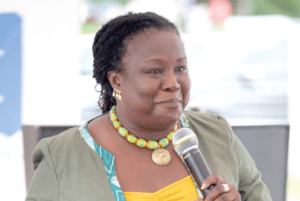Political militarisation, State-actor attacks deteriorating Ghana’s press freedom

Panellists at a forum to commemorate the 2024 World Press Freedom Day raised concerns over the deterioration of press freedom in Ghana.
They cited growing political militarisation and attacks by state-actors against journalists as the major drivers.
They, therefore, called for a collective action to improve the safeguarding of media freedom with decisive actions by authorities to deter people from attacking and abusing practitioners.
Organised by the German Embassy in Ghana and DW Akademie, the forum shed light on the conditions contributing to the retrogressing of Ghana’s freedom of speech and press freedom, and offered solutions to them.
It was on the theme: “Shrinking spaces for journalists and media, new challenges ahead of the election”.
Speaking during the panel discussion, Professor Audrey Gadzekpo of the Department of Communication Studies, University of Ghana, said: “It’s ironic that at the same time that we seem to have had an expansion of media; we now have over 500 FM and TV stations, and a lot of outlets for expression, at the same time, we’re experiencing a deterioration in certain indices,” she said.
“Part of the problem is that there’s a certain militarisation of our politics; our political cultures have become more polarised and the media is part of the arsenal in the political contestation,” she added.
To address the challenge, Prof Gadzekpo called for enhanced institutional collaboration, and effective implementation of policies, and making the National Media Commission (NMC) ‘a fit-for-purpose’ institution.
She also encouraged media practitioners to uphold high professional standards through “responsible journalism,” adding that, “people who make statements that damage the reputation of others must be made accountable.”
Sulemana Braimah, Executive Director, Media Foundation for West Africa, noted that historically, Ghana had been one of the best countries in press freedom, but the system was becoming unfriendly to journalists in recent times.
He called for support systems that would make media houses pay decent salaries to the many journalists who were just surviving and acting unprofessionally to earn a living.
While admitting the decline in press freedom in the country, Mr Sylvester Tetteh, Deputy Minister of Information Designate, said it would take shared responsibility to address the challenges.
“We must all play our parts; more public advocacy, pushing for reforms and ensuring that we hold public officers caught up in some of these incidences to account,” he said.
Meanwhile, in the latest rankings, Ghana moved to 50 from the 2023 position of 62 out of the 180 countries adjudged under the Global Press Freedom Index of the Reporters Without Borders.
The Ministry of Information credited the improvement to the country’s commitment to promoting active participation of journalists in the democratic process and the creation of a conducive environment for journalism to thrive.
Some measures being taken by the Ministry, he said, had contributed to the positive development, including the passage of the Right to Information Act, and the establishment of the Coordinated Mechanism on Safety of Journalists and Media Capacity Enhancement Programme.
Source: GNA
